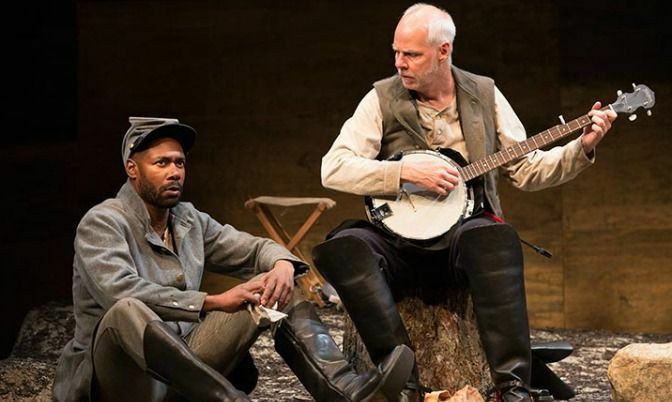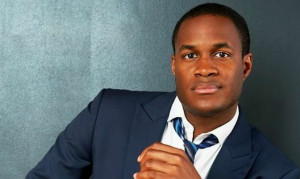If not for the direct mention of the American Civil War, it would be easy to assume that Pulitzer Prize winning Suzan-Lori Parks’ Father Comes Home from the Wars (Parts 1, 2 and 3) is a modern day American tragedy. If you’ve been paying attention to the happenings south of the border, you’ll likely agree. Presented by the Soulpepper Theatre Company, Parks’ three-part epic written in the style of Homer’s The Odyssey and set during the American Civil War is currently making its Canadian debut. One should consider brushing up on The Odyssey before watching the play, it offers both structural and tonal perspective on many of Parks’ choices.
Father Comes Home from the Wars follows the story of Hero (played convincingly by Dion Johnstone) a slave, who has been promised his freedom by his Master (an uncomfortable as it is brilliant performance from Oliver Dennis) in exchange for fighting alongside him in the war. Whether Hero will decide to go to war or not opens the play and establishes the smart and significant similarities between Lori’s latest American masterpiece and Homer’s Greek tragedy. Hero’s devotion to his Master is unwavering, but in this moment it should be shaken. The prize Hero fights for is a worthy one, but Hero would be fighting with the Union; he would be fighting on the pro slavery side.
When Homer (a masterful performance from Daren A. Herbert) challenges Hero to “choose not to choose” he perfectly sums up the truth of the moment, “Cause both choices Hero, to stay here and work the field, to go there and fight in the field, both choices are nothing more than the same coin flipped over and over. And the coin ain’t even in your pocket.” When Hero chooses to go to war, Homer is not surprised. Hero has a conflicted view of his own identity. His worth is very much tied to the price on his head; his value is very much tied to what the Master thinks of him. In Part II, when he is at war with the Master, now a Colonel in the Union Army, they capture an Abolitionist, Smith (Gregory Prest). Hero and Smith discuss a future where the slaves have been freed. This future represents hope and life to Smith, but uncertainty and fear for Hero. “Seems like the worth of a coloured man, once he’s freed, is less than his worth when he’s a slave. I’m worth something, so me running off would be like stealing.”

Parks’ play is poetry, and fittingly so given the writer’s beginnings as a poet before being challenged by James Baldwin to write a play and the play’s Greek inspirations. And yet, though set in the past, the contemporary lilt of Park’s writing is bold as it is subtle. Director, Weyni Mengesha plays to the strength of the script by allowing the actors to maintain elements of modern character. This is most visible in the character of Homer: his walk, his contemporary tongue, his almost “beyond slavery” outlook on life. This also required directing. The Oldest Old Man (Walter Borden) is remnant of the elder in Greek storytelling, Penny (a flawless performance), the wife that Hero leaves behind to go to war, could be seen as the tapestry of every Black woman in America, of every woman written in a tragedy. Hero’s Dog, wittingly named Odd-see “Odyssey” (energetically delivered by Peter Fernandes) is the familiar Greek chorus dressed in fur.
In each movement, as we move through the productions’ three parts, your attention must never falter. You will miss Parks’ unparalleled ability to bury nuance between lines, to make subtle and powerful commentary on the moment in which we sit. Hero’s conflict is one being lived in Black communities across both America and Canada today. What are my choices? Is freedom my reality or my dream? To go against the grain, to dare to be, may leave you, figuratively speaking, without a foot like Homer after he attempted to run away. Homer and Hero are two mirrors of the same Black man, two mirrors of America. When we arrive at the end of Part III, Hero returns home with a freedom declaration he never gets to read and a new name, Ulysses, a name significant to both the American Civil War and The Odyssey. Hero, by the end, may not seem deserving of either name, but he’s alive at the end, alone but alive. Will there ever be a time when a Black man returning home alive isn’t a victory?
Father Comes Home from the Wars runs until August 27th. (soulpepper.ca)
![[REVIEW] A Modern American Tragedy: Father Comes Home from the War](/media/k2/items/cache/1aa2f7441c2e1e8ce1ae43bf58de9bfa_L.jpg?t=20170408_224438)
 By
By 




![[REVIEW] Latest From d'bi young Puts Audience Centre Stage](/media/k2/items/cache/bab3071b5f24a146af315fe2e7519640_S.jpg?t=20181007_192821)
